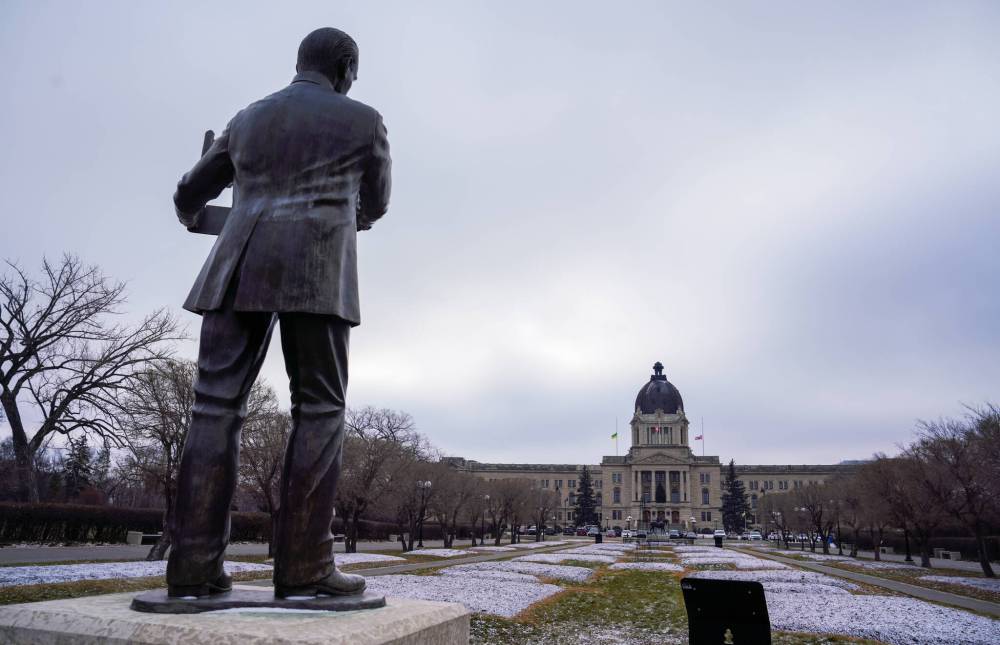Sask. on course for record $427M deficit
Advertisement
Read this article for free:
or
Already have an account? Log in here »
We need your support!
Local journalism needs your support!
As we navigate through unprecedented times, our journalists are working harder than ever to bring you the latest local updates to keep you safe and informed.
Now, more than ever, we need your support.
Starting at $15.99 plus taxes every four weeks you can access your Brandon Sun online and full access to all content as it appears on our website.
Subscribe Nowor call circulation directly at (204) 727-0527.
Your pledge helps to ensure we provide the news that matters most to your community!
To continue reading, please subscribe:
Add Brandon Sun access to your Free Press subscription for only an additional
$1 for the first 4 weeks*
*Your next subscription payment will increase by $1.00 and you will be charged $20.00 plus GST for four weeks. After four weeks, your payment will increase to $24.00 plus GST every four weeks.
Read unlimited articles for free today:
or
Already have an account? Log in here »
REGINA — This year’s Saskatchewan budget is sinking deeper into the red, mainly due to the cost of fighting the summer’s wildfires and higher health-care expenses.
Finance Minister Jim Reiter, in a midterm update Tuesday on the budget, said the projected year-end deficit is expected to be $427 million.
It’s a major swing from when the budget was introduced in the spring.

The Saskatchewan Legislative Building in Regina is shown on Tuesday, when the government announced the projected year-end deficit is expected to be $427 million. (The Canadian Press)
At that time, Premier Scott Moe’s government was projecting a $12-million surplus, but in August the bottom line was revised to a $349-million deficit before sinking further in the latest update.
“There’s difficulties we’re dealing with,” Reiter told reporters. “I’d like to be in a surplus position, but a lot of the economic factors we’re dealing with, most of them aren’t provincial issues — they’re geopolitical issues.”
He said the next budget, to be announced in the spring, will likely have a deficit.
“But I’m optimistic,” he said. “If we can get through some of this silliness with trade issues with our major trading partners … we are very, very well positioned for the future.”
The province says total exports have also fallen by $1.4 billion due to lower oil and gas prices.
Tariffs from the United States have caused revenues from Saskatchewan’s forestry sector to fall by $121 million. The metal industry has also seen a decline of $94 million. China’s tariffs, which hit canola and other agricultural products, have cost the sector $136 million.
Reiter argued the impact has been marginal, as most of Saskatchewan’s goods are compliant with the current Canada-United States-Mexico agreement.
He said he won’t speculate on the effects to Saskatchewan’s economy should Canada not resolve issues with the U.S. and China.
“We’re hoping the federal government is reaching out to the U.S. government trying to get deals in place,” he said.
“Free trade is so important to us.”
The province is earmarking an additional $295 million for fighting the summer wildfires that forced 10,000 people to flee their homes. It also plans on spending an extra $250 million on health care, mostly to deal with pressures in hospitals.
Revenues are up by $82 million due to higher fees and an increase in federal transfers that cover declines in farm income.
The province is forecasting net debt to be $39.8 billion by the end of this fiscal year, an increase of $962 million or 2.5 per cent.
The Opposition NDP said the Saskatchewan Party government can’t be trusted with the province’s finances.
NDP finance critic Trent Wotherspoon called the surplus projection a work of fiction.
“It would all be comical if it all didn’t come at such a cost to Saskatchewan people,” he said. “Their mismanagement of our public finances is something that should be accepted by no one.”
Wotherspoon said the province’s books are poised to get worse, pointing to a line item that shows the government plans to collect $431 million in revenue from industrial carbon levies.
» The Canadian Press
Moe paused the collection of those levies in March, and is trying to work out a deal with the federal government on industrial carbon pricing.
But without those dollars, the deficit would be larger, Wotherspoon said.
Reiter said talks with Ottawa continue.
“We don’t know what that dollar amount will be because we don’t know what the arrangement with the federal government will be,” he said.
» The Canadian Press
